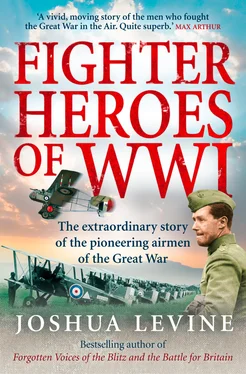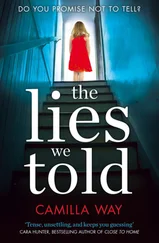William Berry, some way down the social order, was so keen to join the Flying Corps, that he accepted the only job available:
I didn’t think about volunteering straight away when war broke out. I rather fancy my parents were against it. They didn’t want me going out and getting killed. There were lots of posters up. Kitchener with a finger pointing, Kitchener wants you. There were all the recruiting meetings in Trafalgar Square with Horatio Bottomley very much to the fore. There were also recruiting sergeants who stopped you in the street and I was quite frequently stopped: ‘A young fellow like you, why aren’t you in the army?’ sort of thing. That was the general line, which was quite true, and I resented it very much because I really wanted to volunteer, but my parents weren’t very amenable. They were very patriotic, but in those days you obeyed what your parents told you, and I wasn’t twenty-one years old.
Then one day, I happened to go to the cinema in Croydon, and one of the newsreels showed a house in Belgium. There were German soldiers knocking in all the windows with the butts of their rifles. They then set the house on fire because it was in the way of their guns. I was very upset at this. I sympathized, and I thought, ‘Right! I am going to do something about it!’ So I wrote to the Royal Flying Corps at Farnborough.
I had had a pre-war interest in going to Hendon and seeing all the early pioneers. If you saw an aeroplane in those days, it was quite something. Flying, I thought, was the coming thing, and the RFC was open again for recruits. Directly the Flying Corps was opened, in about five minutes, it was full up, as they’d got all the recruits they wanted. They had no difficulty getting recruits of a good calibre who knew their trades and knew what they were doing. I wrote and said I wanted to enlist and I got a letter back immediately, saying that they would welcome me as a wireless operator, and would I go to the recruiting centre in Farnborough?
So I went to the recruiting centre and they said, ‘I’m sorry, you can’t join the Royal Flying Corps, it’s closed.’ I said, ‘That’s impossible, I’ve got this letter from them!’ and they said, ‘It closed this morning! You’re too late! Why don’t you join the local regiment, the Seventh King’s Royal Rifles?’ As my father had been in the ‘Shiny 7th’, I thought, ‘Well, that’s an idea.’ So I got the recruiting form and got three-quarters of the way through it when I thought, ‘No! I’m going to join the Flying Corps!’ I tore up the form and put it in the wastepaper basket.
I told the Recruiting Major that I was very disappointed that I’d got his letter but that now I couldn’t join, and he was very much impressed with the trouble I’d taken to get all that way from London to Farnborough. He said, ‘We are short of cooks. Have you ever done any cooking?’ I said, ‘I really can’t say I’m a cook, but to get into the Flying Corps, I’m willing to take it on.’ He said, ‘Right! Hold up your hand!’ I was sworn in, and I was a recruit and I spent that night at the recruits’ barracks at Farnborough.
Leslie Murton joined out of a desire to exact revenge:
I was born in Magdalen Street, Norwich, in my grandfather’s shop. My father was one of the finest turned shoemakers there ever was. One of the fastest. My eldest brother was a printer at the Eastern Daily Press . The next brother to him, Bertie, was training to be a hotel manager in London. Another brother, Sidney, was a motor mechanic.
I left school at fourteen, in the year that war broke out. At the time, it didn’t mean much to me. But one day I came home from school, and my mum told me to read this letter. She could never read or write. It was from my brother in London. He said the girls were putting white feathers in his cap as he walked through the streets. He said he couldn’t stand it, so he’d enlisted in the King’s Royal Rifles. At the same time, my eldest brother had enlisted in the 7th Norfolks. Well, after a period, my brother in London said he couldn’t stand the London people, they were rough to him, and in those days, you could transfer from one regiment to another, provided you had relations in the new regiment. So he transferred to the 7th Norfolks to be with his brother.
A little later, Sidney was sent straight to France as a transport driver. When he was there, he was sent down to the docks, where he met the regiments coming in, and he ran into my two brothers in the 7th Norfolks. He told me later that he’d said to them, ‘Thing is, I won’t see either of you two again.’ And he was true to his word. On 13 October 1915, the two of them were killed side by side.
When we got the news from the War Office, I had to go to my father’s place of business. I told him. He took his apron off, threw it down. I can see him now. He’d been a teetotaller for years but he said, ‘I’ll never come back till I’ve spent every penny.’ And my dad never came back to work again, until he’d drank his money away. And after that, my poor old mother tried to do something to herself, but she was saved. You can understand it, can’t you, when you lose two young boys of that age? It affected me as well. When I was old enough, I was going to get my own back.
From the time my brothers died, my mother put a memorial, every year, in the Eastern Evening News , where my brother had been a printer. One day, a man came to my office, where I was working, and said, ‘Excuse me, Mr Murton. Could I ask you a question?’ ‘Certainly,’ I said. ‘I see in the paper, last night, there was a memorial to the Murton brothers.’ ‘Yes,’ I said. ‘I would like to know whether you’re a relation,’ he asked. ‘Matter of fact,’ I said, ‘they’re my two brothers, who were killed.’ ‘What I want you to know,’ he said, ‘is that I buried one of them. I was a stretcher bearer at the time, in France, in the 7th Norfolks, and I buried him, but the other one, his brother, was blown to pieces.’ And that’s the tragedy of my two brothers.
In the later part of 1915, the Royal Flying Corps formed a boys’ section. I was sixteen, and I forged my mother’s signature, and went up to Britannia barracks, where I was sworn in, and they told me that a month before I was seventeen, I would hear from them. And I did.
When I got called up, one evening, two military policemen came to my house with a warrant and said, ‘Leslie Murton?’ and my mother said, ‘Yes!’ because I was out with the boys. They said that I had to catch such and such a train tomorrow to London and then another to Aldershot, for the Royal Flying Corps. Next day, I took the train to Liverpool Street Station. I’d never been further than Yarmouth in my lifetime!
So at Liverpool Street, I got off the train and there was a policeman, and I said, ‘Excuse me, old chap, how do I get on the Underground?’ So he told me where to go. I followed his directions, until I saw a dustman, who was sweeping up the horse manure. I said to him, ‘Excuse me, where’s the Underground?’ ‘Down there!’ he said, pointing down some steps. ‘Look, old chap,’ I said, ‘I may have just come from the country, but I’m not daft enough to go down there! You’re trying to send me down the toilet!’ I thought he was. I’d never seen the Underground before. So he took me down and I got the train and went off to Aldershot. When I got there, I was really hungry, so I went out into the street, to a fried fish shop. I got some fish and chips, and just as I opened the paper to eat some, I saw my fish and chips going up in the air. Two military police had kicked it out of my hands. ‘You don’t do that here!’ one of them said. I was in the services now.
Those who joined the other ranks of the Royal Flying Corps often considered themselves a cut above the humble infantryman. Cecil King:
Читать дальше












